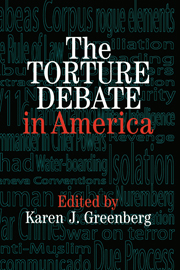Book contents
- Frontmatter
- Contents
- Acknowledgments
- List of Contributors
- Introduction: The Rule of Law Finds Its Golem: Judicial Torture Then and Now
- THE ISSUES
- ESSAYS
- Section One: Democracy, Terror and Torture
- Section Two: On the Matter of Failed States, The Geneva Conventions, and International Law
- Section Three: On Torture
- Section Four: Looking Forward
- 19 Litigating Against Torture: The German Criminal Prosecution
- 20 Ugly Americans
- RELEVANT DOCUMENTS
- AFTERTHOUGHT
- Index
19 - Litigating Against Torture: The German Criminal Prosecution
Published online by Cambridge University Press: 05 August 2012
- Frontmatter
- Contents
- Acknowledgments
- List of Contributors
- Introduction: The Rule of Law Finds Its Golem: Judicial Torture Then and Now
- THE ISSUES
- ESSAYS
- Section One: Democracy, Terror and Torture
- Section Two: On the Matter of Failed States, The Geneva Conventions, and International Law
- Section Three: On Torture
- Section Four: Looking Forward
- 19 Litigating Against Torture: The German Criminal Prosecution
- 20 Ugly Americans
- RELEVANT DOCUMENTS
- AFTERTHOUGHT
- Index
Summary
ON NOVEMBER 30, 2004 THE CENTER FOR CONSTITUTIONAL RIGHTS (CCR), a U.S. based human rights legal organization, filed a criminal complaint in Germany seeking an investigation of and prosecution against ten high level U.S. officials allegedly involved in the torture and inhumane treatment of detainees in Iraq. Complainants were CCR as well as four Iraqis who had been brutally tortured. The 160-page complaint was filed with the prosecutor in Karlsruhe, Germany. It charged Secretary of Defense Donald Rumsfeld, former CIA Director George Tenet, Lt. General Ricardo Sanchez, the former Commander of U.S. forces in Iraq, and seven other high-ranking officials and officers with war crimes under the German Code of Crimes under International Law (CCIL). CCR later added an eleventh defendant, U.S. Attorney General Alberto Gonzales, subsequent to his admission at his confirmation hearing that he had been involved with drafting and approving legal memoranda authorizing torture and inhumane treatment of detainees.
CCR decided to bring this case in a national court of a foreign state because there was no U.S. or international forum where the criminal responsibility of high U.S. officials for war crimes could be investigated and prosecuted. Although it would have been preferable to prosecute war crimes domestically or in an international court, that was not possible. In the United States there is no legal procedure under which victims can file criminal complaints; only prosecutors, who have complete discretion whether or not to do so, can file such cases.
- Type
- Chapter
- Information
- The Torture Debate in America , pp. 261 - 266Publisher: Cambridge University PressPrint publication year: 2005



